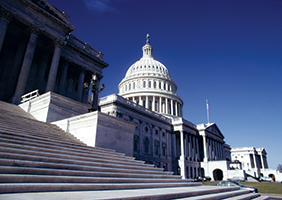Newsroom
NAFCU calls on SBA to provide automatic forgiveness as senators review PPP
 As the Senate Banking Committee Wednesday sought insights into the paycheck protection program (PPP) from Small Business Administration (SBA) Administrator Jovita Carranza and Treasury Secretary Steven Mnuchin, NAFCU raised its support for automatic forgiveness of PPP loans under $150,000 directly to Carranza.
As the Senate Banking Committee Wednesday sought insights into the paycheck protection program (PPP) from Small Business Administration (SBA) Administrator Jovita Carranza and Treasury Secretary Steven Mnuchin, NAFCU raised its support for automatic forgiveness of PPP loans under $150,000 directly to Carranza.
NAFCU sent a letter to the committee prior to the hearing and made this recommendation. NAFCU President and CEO Dan Berger further detailed how automatic forgiveness would benefit small businesses and credit unions that are recovering from the coronavirus pandemic with strained financial and human resources in a follow up letter to Carranza.
Although testimony during the hearing indicated the SBA and Treasury are working to reduce complexities in the loan forgiveness application, Berger said "NAFCU members remain concerned about the complex process," which requires borrowers to collect and report various documentation and calculate their entitled loan forgiveness amount. He also shared findings from a NAFCU survey that revealed credit union respondents' PPP loans averaged $67,000, with some as low as $400.
"With the current complexities of the loan forgiveness application and rules, credit unions will again need to devote significant resources to complete loan forgiveness applications," Berger said. "Additionally, many credit unions are weighing whether they need to invest in new software applications to assist with loan forgiveness determinations, which could put additional strain on already limited resources.
"Given that credit unions have followed the spirit of the CARES Act and focused their PPP lending on the communities that need the most assistance during this difficult time, instead of prioritizing larger businesses with deep pockets, these smaller loans should be automatically forgiven," he added.
In addition to relieving strains on human capital, Berger argued that automatic forgiveness is a low-risk, high reward approach as the SBA retains the right to review loan documentation to uncover fraud. If the agency determines it does not have the authority to grant automatic forgiveness under the current law, he urged the SBA to support a legislative fix to do so.
Forgiveness was brought up several times during Wednesday's hearing, with Sens. John Kennedy, R-La., and Joni Ernst, R-Iowa, questioning the amount of paperwork required and complexity of the form. Mnuchin said those who qualify for the safe harbor (loans under $2 million) should have an easier time and expected most of the PPP loans to be forgiven.
Sens. Maria Cantwell, D-Wash., and Tim Scott, R-S.C., also noted the importance of supporting Community Development Financial Institutions (CDFIs) that are participating in the program to expand access to capital in underserved and minority areas. The SBA and Treasury recently set aside an additional $10 billion of the PPP's round two funding for CDFIs. NAFCU has urged Congress to strengthen the PPP by providing more funds and set asides for Community Development Financial Institutions (CDFIs) and minority depository institutions (MDIs).
Following the enactment of the Paycheck Protection Program Flexibility Act, the SBA Tuesday issued an operations update to lenders noting the new 5-year maturity of PPP loans will be automatically reflected in E-Tran. For loans approved before the law's enactment, the agency noted lenders and borrowers may mutually agree to an extension of maturity from the original 2 years to 5 years.
NAFCU will continue working with the SBA, Treasury and Congress to ensure credit unions have the guidance and resources needed to effectively lend through the PPP.
Share This
Related Resources
The Ride-Share Conundrum: An Exception to an Exception
Business Lending
Blog Post
Taking Care of Business: Recent Developments in Commercial Lending
Business Lending
Blog Post
Marijuana Banking Issue Brief
Whitepapers
Loan Maturity Issue Brief
Whitepapers
Get daily updates.
Subscribe to NAFCU today.
